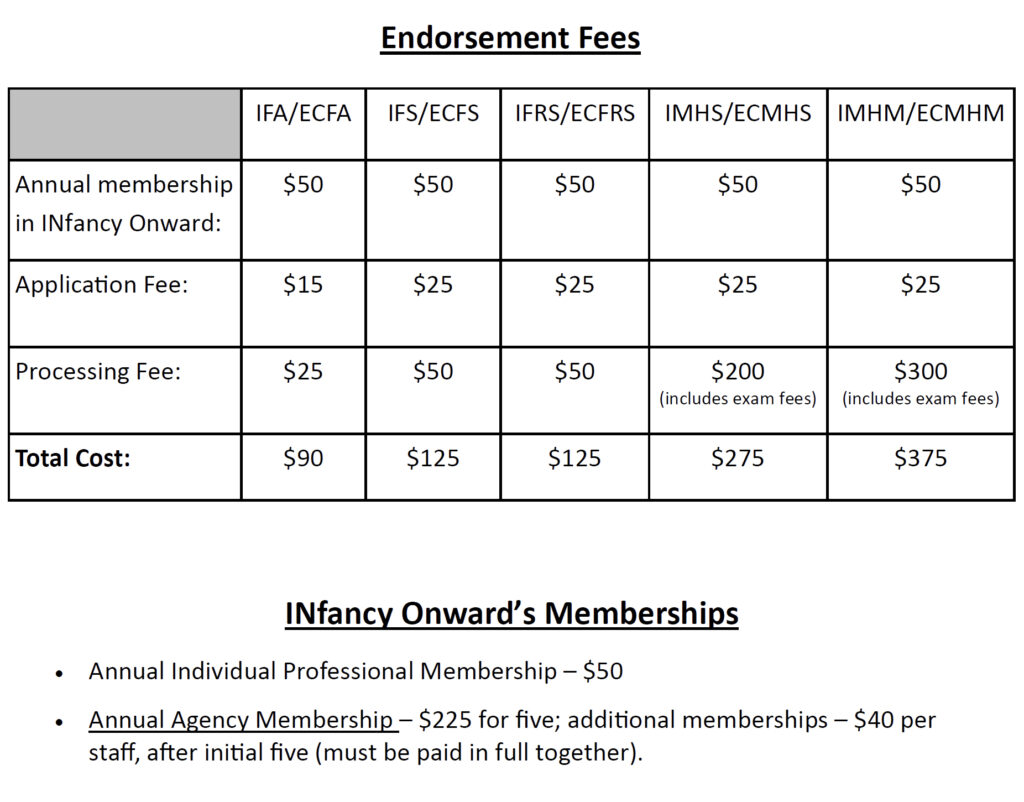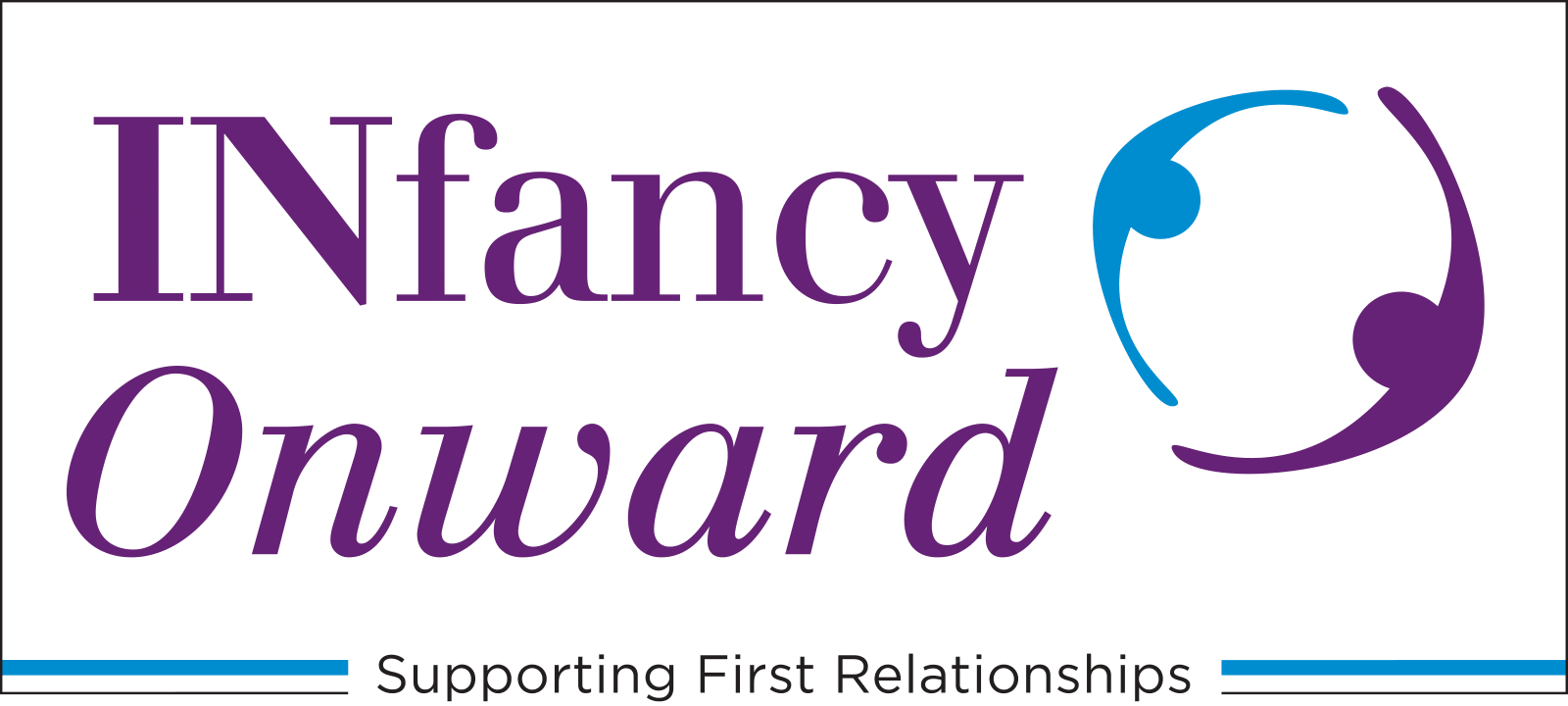Frequently Asked Questions
Endorsement
- Register on the Endorsement Application System (EASy), which involves submitting preliminary information and paying the EASy registration fee
- When registering on EASy, it is strongly recommended that you register using a personal email address (e.g., Gmail, yahoo, Hotmail, etc.). Employer email servers often block messages sent by EASy.
- EASy applicants must have a current membership with Name of AIMH or another IMH association.
- INFANCY ONWARD memberships run on a calendar year.
- EASy will email you a username and password.
- Build your professional application, including work, in-service training, and supervisory experiences. This reflects your capabilities within the infant, young child, and family field.
- You will be asked to list the names and email addresses for the 3 individuals who will complete reference rating forms on your behalf. EASy will send an email to each reference rater; the whole process is done electronically. Please ask your reference raters for a personal email address so they will receive the secure link to complete the form on EASy.
- Once your application is complete you may “Submit” by clicking the button that appears on your EASy dashboard. This includes paying the Endorsement Processing Fee.
- Applications are reviewed quarterly. Check our Calendar to see when the next review will take place.
- Infant/Early Childhood Family Associate, Infant/Early Childhood Family Specialist and Infant/Early Childhood Family Reflectie Supervisor applicants receive an Endorsement decision after at least one trained reviewer, who has earned Endorsement, examines, and approves the application.
- Infant/Early Childhood Mental Health Specialist & Infant/Early Childhood Mental Health Mentor applicants move on to the written Endorsement exam after at least one trained reviewer, who has earned Endorsement, examines and approves their application Check our Calendar to see when the next exam will take place.
- ENDORSEMENT
If you have questions while in EASy, there are Comment boxes within every tab of the Endorsement application where applicants can ask questions or leave remarks. If you have other questions, unrelated to EASy, email the Endorsement Coordinator.
INFANCY ONWARD requires that applicants register on EASy a minimum of 4-weeks before an intended submission date. This ensures enough time for receipt and upload of transcripts, completion of reference ratings, and thorough entries related to applicant’s specialized work, in-service training, and RSC experiences.
Most applicants spend an average of 6 months completing their Endorsement application. That said, this depends largely on applicants’ work, supervision, and training experiences in addition to the Endorsement category for which they are applying.
The costs for Infant/Early Childhood Specialist and Infant/Early Childhood Mentor are in line with credentialing fees that have been established by other professional organizations, e.g., CDA (Child Development Associate) and ACSW (Accreditation for Certified Social Workers). The credentialing fees support the overhead costs of the INFANCY ONWARD Endorsement and allow us to have applications and exams carefully reviewed.

All applications are carefully reviewed by at least one trained application reviewer who has earned Endorsement. The application reviewer will examine your transcripts, reference rating forms, and qualifying specialized work, in-service training, and RSC experiences. Then they will make a recommendation about whether to recommend your application for Endorsement, to approve you to sit for the Endorsement exam, or may suggest that you pursue further work, training and/or RSC experiences and then have your application be re-reviewed after a period of time.
Neurons to Neighborhoods (Shonkoff & Phillips, 2000) and Transforming the Workforce for Children Birth through Age 8: A Unifying Foundation (2015) report there is a critical shortage of well trained professionals who have knowledge, skills, and supervised work experience to promote healthy social and emotional development, and to intervene and treat serious early childhood mental health problems.
By engaging in Endorsement, you will:
- Grow and develop as a professional in the rapidly expanding infant, young child, and family service field
- Be recognized by employers and peers for having attained a category of competency in culturally sensitive, relationship-based practice that promotes infant and early childhood mental health
- Become a part of one of the first and most comprehensive international efforts to identify best practice competencies at multiple levels and across disciplines and to offer a pathway for professional development in the infant and family field.
The Infant Mental Health Endorsement® (IMH-E®) and Early Childhood Mental Health Endorsement® (ECMH-E®) marks indicates that a person has earned Endorsement. Use of the registered trademark is important (whenever possible) to distinguish from other systems of “endorsement.”
Examples:
Jane Doe, MSW, LMSW, IMH-E®
Infant Mental Health Specialist
Jane Doe, MA, IMH-E®
Infant Mental Health Mentor – Clinical
Jane Doe, MS, ECMH-E®
Early Childhood Mental Health Specialist
Jane Does, PhD, ECMH-E®
Early Childhood Mental Health Mentor – Policy
Reflective Supervision/Consultation
RSC that meets criteria for Endorsement must come from an individual who has earned Endorsement as an Infant/Early Childhood Family Reflective Supervisor, Infant/Early Childhood Mental Health Specialist or Infant/Early Childhood Mental Health Mentor-Clinical. Be sure to check which Endorsement category your Endorsement requires you receive RSC from.
Many individuals do not have a direct supervisor who has earned Endorsement; however, they do receive RSC from a consultant who is endorsed. If your team meets with an endorsed consultant, you can count the hours of time that you spend with the consultant, even if you are not the identified presenter. For example, if you meet and participate in case consultations once a month for two hours, you will have 24 hours of RSC that meets criteria for Endorsement.
Peer supervision (defined as colleagues meeting together without an identified supervisor/consultant to guide the reflective process), while valuable for many experienced practitioners, does not meet the RSC criteria for Endorsement. The provider of reflective supervision is charged with holding the emotional content of the cases presented. The ability to do so is compromised when the provider is a peer of the presenter. Unnecessary complications can arise when the provider of reflective supervision has concerns about a peer’s ability to serve a particular family due to the peer’s emotional response AND the provider and peer share office space, etc.
Training
You will include as many hours of relationship-based in-service training and/or continuing education as necessary to document that the competencies (as specified in Competency Guidelines) have been met.
You will list which specific knowledge/skill areas are covered at each training, e.g., attachment, separation, and loss; cultural competence; etc. For a training to count toward Endorsement at least one competency must have been covered. It is important to remember that Endorsement reflects training specialization in the promotion of culturally sensitive, relationship-based practice promoting social and emotional well-being in the first years of life or infant and early childhood mental health.
This varies greatly depending on many factors including how long ago you took college courses, how specific the course or training is to infant and early childhood mental health, number of hours, etc. That said, you can use the Competencies page of your EASy application to help you determine this. This page is intended to be used as a “self-study” to help you assess your education and in-service training experiences and determine what additional specialized training might be necessary to meet the competencies and earn Endorsement. You are encouraged to review this “self-study” with an advisor, endorsed colleague, supervisor, mentor, or provider of RSC before submitting your application as an informal review. Someone who has been through the Endorsement process themselves will have important and beneficial feedback to share with you!
At least one trained application reviewer will carefully examine all the material in your application including college transcripts, in-service training record, and reference rating forms. An application reviewer will be looking most closely at the competency areas under Theoretical Foundations, Direct Service Skills, and Reflection. For the areas of Theoretical Foundations (including pregnancy & early parenthood; infant/very young child development & behavior; attachment, separation, trauma, & loss; cultural competence; etc.) and the areas of Direct Service Skills (including observation & listening; screening & assessment; etc.) competency must be documented by course work and/or in-service training. That is, work experience alone is not enough to document competency in areas such as attachment, separation, trauma, & loss or screening & assessment.
There is no limit on how long ago the training was attended to be counted toward requirements. Some applicants may have been in the field for many years and are encouraged to include all the trainings that have shaped their practice in infant, early childhood-family work. However, it is not necessary to submit a comprehensive list of every training ever attended. The list should reflect a balance of breadth and depth across the competencies and the promotion of infant and early childhood mental health.
The training does not need to be sponsored by INFANCY ONWARD to be eligible to count toward your minimum for Endorsement. In fact, many trainings that you attend for professional licensing or agency requirements may also qualify for Endorsement(e.g., an ethics training for social workers, Part C training about family-centered planning, or doula training, to name only a few).
A specialized training that is eligible for Endorsement should meet the following criteria:
- Is culturally sensitive, relationship-focused and promotes infant and early childhood mental health
- Relates to one or more of the knowledge/skill areas in the Competency Guidelines
- Is specific to the Endorsement category for which you are applying
No, however, we strongly recommend that you carefully review the Competency Guidelines to identify the knowledge/skill areas for the Endorsementcategoryfor which you are applying. We expect applicants to document competency in these areas either through college course work, on-the-job training, in-service training opportunities, and RSC. It is important to seek out in-service training/conference offerings that will fill in any competency gaps you might have. Some skill areas (such as empathy and compassion, self-awareness) will be documented in the three reference ratings that you will include with your application.
Trainings that might not meet criteria would be focused primarily on school-aged children, adolescents, or the elderly.
Work
Infant Family Specialist work experience is typically broader and encompasses many of the ways that applicants might work with the families of infants and toddlers including case management, Part C service coordination, home visiting, parent education, and family support.
Infant Mental Health Specialist work experiences include the following interventions: advocacy, developmental guidance, emotional support, concrete assistance, and parent-infant/very young child relationship-based therapies and practices (e.g., Infant Parent Psychotherapy). These therapies and practices are intended to explore issues related to attachment, separation, trauma, and unresolved losses as they affect the development, behavior, and care of the infant/very young child. Competence as an IMHS builds with supervised work experience over time with services delivered to the families of infants and toddlers that are relationship-focused and culturally sensitive with an emphasis on examining the role of relationships in reflective supervision.
Early Childhood Family Specialist work experience is typically broader and encompasses many of the ways that applicants might work with the families of young children (3 up to 6-years of age) including case management, home visiting, parent education, and family support.
Early Childhood Mental Health Specialist work experiences include the following interventions: advocacy, developmental guidance, emotional support, concrete assistance, and parent-infant/very young child relationship-based therapies and practices (e.g., Child Parent Psychotherapy). These therapies and practices are intended to explore issues related to attachment, separation, trauma, and unresolved losses as they affect the development, behavior, and care of the young child. Competence as an ECMHS builds with supervised work experience over time with services delivered to the families of young children (3 up to 6-years of age) that are relationship-focused and culturally sensitive with an emphasis on examining the role of relationships in reflective supervision.
Yes, work with pregnant people and families does count towards the required work experience. However, the applicant’s work experience must ALSO include work with infants, toddlers, and their families.
Exam
There are two parts to the Endorsement exam.
Part One (60 Multiple Choice Questions – 90 minutes)
The multiple-choice, or quantitative, section is primarily focused on infant and early childhood mental health knowledge specific to work with infants, young children, and their families. Most questions will be related to direct service, but there will be some questions related to reflective supervision/consultation, policy, and research. The multiple-choice section is the same for all Specialist and Mentor applicants. Knowledge gained through course work, specialized in-service training, and self-study will be most useful in this section of the exam. IMH-E® applicants are expected to have knowledge on pregnant people, infants, young children (up to age 3), and families. ECMH-E® applicants are expected to have knowledge on pregnant women, infants, young children (up to age 6), and families.
Part Two (Vignettes – 90 minutes)
The qualitative section will ask for responses to vignettes. This section is intended to measure the applicant’s capacity to apply their knowledge of IECMH principles into practice and to demonstrate a reflective, relationship-based approach. While all of the competency areas are important, the ones under the Reflection, Thinking, and Working with Others domains are important to the qualitative section for Specialists and Mentors – Clinical.
The Administration domain is the primary focus of the Policy exam. Policy applicants are asked to demonstrate a capacity to promote IECMH principles and practices within and across systems.
The Research & Evaluation domain is the primary focus of the Research/Faculty exam. In the Research/Faculty exam, one scenario is more specific to teaching; the other scenario is more specific to empirical research. Research/Faculty applicants will demonstrate a commitment to IECMH principles and practices related to research or course planning and instruction.
The multiple-choice questions are related to the knowledge and skill areas of the competencies as indicated in the Competency Guidelines, such as:
- Attachment separation, trauma, grief, and loss
- Pregnancy
- Infant and young child development and behavior
- Relationship-based therapeutic practice
- Infant mental health screening and assessment
- Disorders of infancy/early childhood
- Diversity, Equity and Inclusion
- Reflective practice
Studying for the test will vary from person to person. If you are currently engaged in relationship-based practice with infants, young children, and their families, receive reflective supervision and have consistently updated your knowledge and skills through specialized in-service training or enrollment in university or college course work specific to infancy, early parenthood, and infant and early childhood mental health, you will most likely be very well prepared. If you have not engaged in a great deal of clinical practice or attended in-service trainings or university-based coursework specific to the promotion of infant and early childhood mental health, you will likely find the exam challenging.
A passing score on Part 1 (multiple choice) of the exam is 80%. Applicants who receive a score of less than 80% will be invited to take the exam again after 6 months. Applicants who do not receive a passing score on Part 2 (response to vignettes/scenarios) will be provided specific feedback based on exam reviewers’ remarks. Those applicants will be invited to take part 2 of the exam again after one year.
Renewal
In order to renew Endorsement annually, the following is required:
- On-going membership in NAME OF AIMH
- 15 clock hours of training related to culturally-sensitive, relationship-focused practice promoting infant and early childhood mental health. If you are a provider of RSC, at least 3 hours of the 15 hours required need to be about the provision of RSC. Starting in 2024, all endorsed professionals will need at least one hour of DEI (diversity, equity and inclusion) training, specific to IECMH, each year for renewal as well
- 12 clock hours of RSC annually for professionals endorsed at IFS/ECFS, IFRS/ECFRS, IMHS/ECMHS, and IMHM-C/ECMHM-C*
*This renewal requirement applies to all IFS/ECFS, IFRS/ECFRS, IMHS/ECMHS and IMHM-C/ECMHM-C professionals, regardless of when Endorsement was originally earned.

